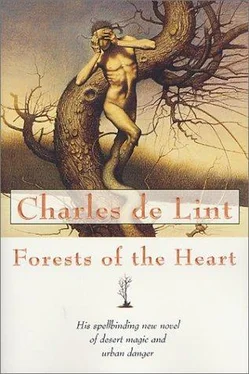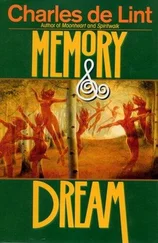Forests of the Heart
by Charles de Lint
Grateful acknowledgments are made to:
Miss Anna Sunshine Ison for the use of her cadejos poem , and for allowing me to make a slight adjustment in it to fit the story.
Ani DiFranco for the use of lines from “Pixie” from her album Little Plastic Castle.
for
Karen Shatter and Charles Vess
the stars shine brighter
where you walk
Special thanks to Mary Ann for helping me find the time to write this through a couple of years that were inordinately busy; Charles Vess for providing me with some of the Green Man material (though I hasten to add that my take on that venerable figure is far different from the usual folkloric depictions); Miss Anna Sunshine Ison for los cadejos; Mardelle and Richard Kunz for putting up with far too many questions by e-mail—and for tracking down the answers to them; Jim Harris for the lexicon; Rodger Turner and Paul Fletcher for valiantly helping me through some rather severe computer woes (and thanks as well to Rodger for that early reading of the manuscript); Barry Ambridge for straightening me out on tires; Swain Wolfe for explaining the difference between power and luck; Lawrence Schmiel for vetting the Spanish (any errors are mine); Amanda Fisher for once again helping with the bookmarks; and the folks at Tor for being very patient this time.
I’ve been taken to task by a number of readers for not noting the music I was listening to when I’ve written my last few books. So, this time out my ears were filled, my toes tapped, my spirit was made more full by… well, too large a number of fine musicians to list them all here. But briefly, of late I’ve been listening to a lot of Steve Earle, Fred Eaglesmith, Dar Williams, Ani DiFranco, Stacey Earle, Buddy Miller, Tori Amos, the Walkabouts (including their “Chris and Carla” recordings), and all the various incarnations in which Johnette Napolitano finds herself, one of my favorites being the CD she recorded with Los Illegals.
When I’m actually writing, however, I lean more towards instrumental music where the words in my ear don’t interfere with the words going down on the screen. For this book that involved less Celtic music than usual, though Solas was never far from the CD player. Mostly I found myself playing some of those neo-Flamenco artists such as Robert Michaels, Ottmar Leibert, Ger-ardo Nunez, and Oscar Lopez, while towards the end of the book, Douglas Spotted Eagle’s Closer to Far Away and Robbie Robertson’s last two albums (Music for the Native Americans and Contact from the Underworld of Red-boy) were in constant rotation.
But man does not live by worldbeat alone. Many of the hours spent on this novel found me nodding my head to Art Tatum, Oscar Peterson, Miles Davis, Bill Evans, Charlie Haden’s duet albums, Clifford Brown, and this wonderful ten-CD set that my friend Rodger gave me: The Complete Jazz at the Philharmonic on Verve.
If you decide to try any of the above, I hope you’ll enjoy them as much as I have.
And as usual, let me mention that the city, characters, and events to be found in these pages are fictitious. Any resemblance to actual persons living or dead is purely coincidental.
If any of you are on the Internet, come visit my homepage. The URL (address) is http://www.cyberus.ca/~cdl
—Charles de Lint, Ottawa, Spring 1999
In the middle of the journey of our life,
I came to myself within a dark wood
where the straight way was lost.
—Dante Alighieri, from
The Divine Comedy
El lobo pierde los ientes mas no las mienies
The wolf loses his teeth, not his nature.
—Mexican-American saying
Like her sister, Bettina San Miguel was a small, slender woman in her mid-twenties, dark-haired and darker-eyed; part Indio, part Mexican, part something older still. Growing up, they’d often been mistaken for twins, but Bettina was a year younger and, unlike Adelita, she had never learned to forget. The little miracles of the long ago lived on in her, passed down to her from their abuela, and her grandmother before her. It was a gift that skipped a generation, tradition said.
“¡Tradición, pah!” their mother was quick to complain when the opportunity arose. “You call it a gift, but I call it craziness.”
Their abuela would nod and smile, but she still took the girls out into the desert, sometimes in the early morning or evening, sometimes in the middle of the night. They would leave empty-handed, be gone for hours and return with full bellies, without thirst. Return with something in their eyes that made their mother cross herself, though she tried to hide the gesture.
“They miss too much school,” she would say.
“Time enough for the Anglos’ school when they are older,” Abuela replied.
“And church? If they die out there with you, their sins unforgiven?”
“The desert is our church, its roof the sky. Do you think the Virgin and los santos ignore us because it has no walls? Remember, hija, the Holy Mother was a bride of the desert before she was a bride of the church.”
Mama would shake her head, muttering, “Nosotras estamos locas todas.” We are all crazy. And that would be the end of it. Until the next time.
Then Adelita turned twelve and Bettina watched the mysteries fade in her sister’s eyes. She still accompanied them into the desert, but now she brought paper and a pencil, and rather than learn the language of la lagartija, she would try to capture an image of the lizard on her paper. She no longer absorbed the history of the landscape; instead she traced the contours of the hills with the lead in her pencil. When she saw el halcón winging above the desert hills, she saw only a hawk, not a brujo or a mystic like their father, caught deep in a dream of flight. Her own dreams were of boys and she began to wear makeup.
All she had learned, she forgot. Not the details, not the stories. Only that they were true.
But Bettina remembered.
“You taught us both,” she said to her abuela one day when they were alone. They sat stone-still in the shadow cast by a tall saguaro, watching a coyote make its way with delicate steps down a dry wash. “Why is it only I remember?”
The coyote paused in mid-step, lifting its head at the sound of her voice, ears quivering, eyes liquid and watchful.
“You were the one chosen,” Abuela said.
The coyote darted up the bank of the wash, through a stand of palo verde trees, and was gone. Bettina turned back to her grandmother.
“But why did you choose me?” she asked.
“It wasn’t for me to decide,” Abuela told her. “It was for the mystery. There could only be one of you, otherwise la brujería would only be half so potent.”
“But how can she just forget? You said we were magic—that we were both magic.”
“And it is still true. Adelita won’t lose her magic. It runs too deep in her blood. But she won’t remember it, not like you do. Not unless….”
“Unless what?”
“You die before you have a granddaughter of your own.”
Tonight Bettina sat by the window at a kitchen table many miles from the desert of her childhood, the phone propped under one ear so that she could speak to Adelita while her hands remained free to sort through the pile of milagros spilled across the table. Her only light source was a fat candle that stood in a cracked porcelain saucer, held in place by its own melted wax.
She could have turned the overhead on. There was electricity in the house—she could hear it humming in the walls and it made the old fridge grumble in the corner from time to time—but she preferred the softer illumination of the candle to electric lighting. It reminded her of firelight, of all those nights sitting around out back of Adelita’s house north of Tubac, and she was in a campfire mood tonight. Talking with her sister did that, even if they were a half continent and a few time zones apart, connected only by the phone and the brujería in their blood.
Читать дальше












